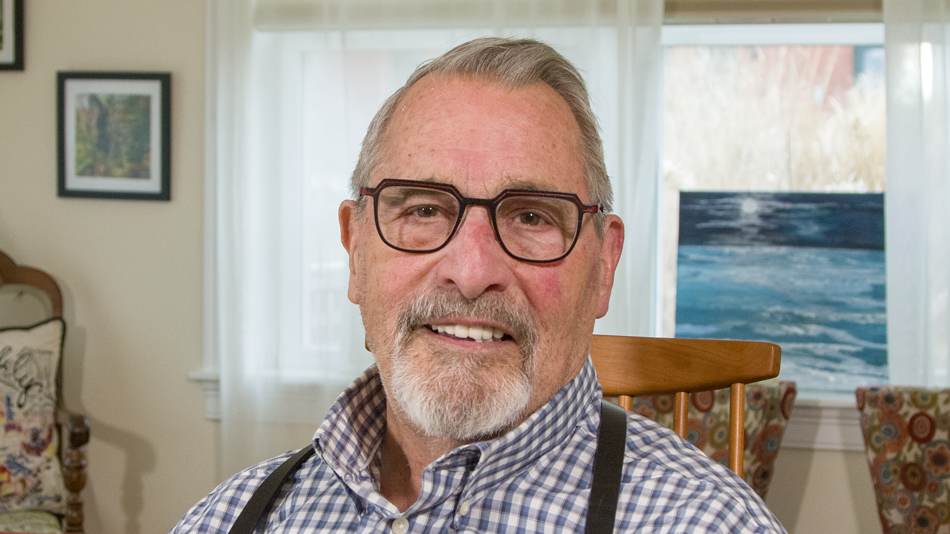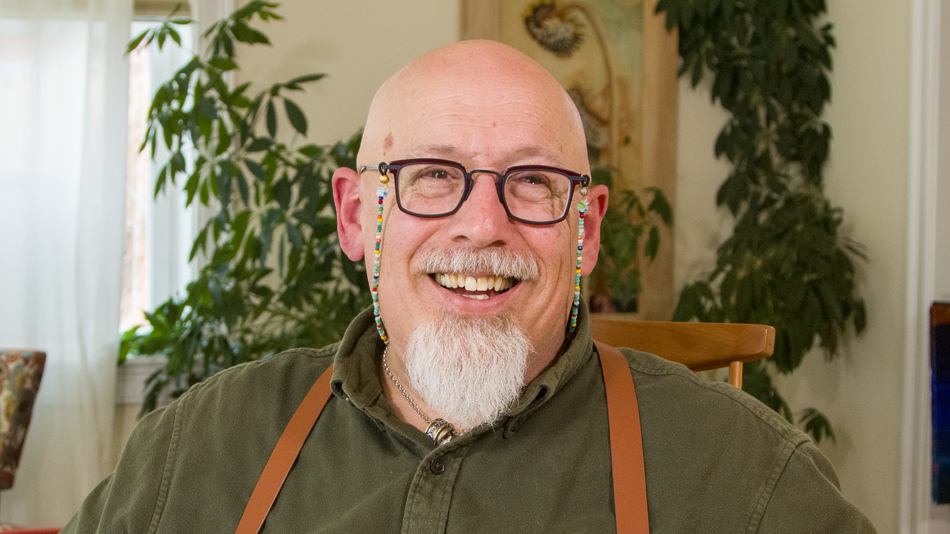My name is Andrew Morrison-Gurza, and I live in Richmond Hill, Ontario.
I am going to tell the story of the first time that I went to a gay bar as somebody with a disability.
I remember that I was 19. I had come out about four years previously to my family, and that was no problem. But I had never really been exposed to the gay scene before, so I was really, really excited, because I had just moved away from home. I was in university, and I went away to school. And I thought, ‘Wow. I’m gay and free and get to experience all these things together!’
So I decided, after much, much debate with some friends, that we were going to go to this gay bar by the university down where I was living. So we decided to go, and I remember before going, we had to get ready. There was all this prep that had to occur. Because I’m in a wheelchair, that would mean that I would have to have somebody help me get dressed, and have somebody help me look my best, and try to “pass” as normal as I could when I’m going to this bar, because I knew that my chair was going to be something that nobody had really seen before.
I didn’t know what to expect. My only experience with gay bars had been what I had seen on TV.
We got ready, and I had to have my friend get me all dressed. We made all these jokes about, “Oh, you’re going to look really good. You’re going to pick out somebody there tonight.”
I was 19, and I was really excited, but also really scared because I had never done it before. So we made a bunch of mix CDs with a bunch of early-2000 pop songs on it, like Christina Aguilera and all those things.
And I just thought, ‘Okay. I really have to hype it up, and get really excited and really do it, ’cause this is my first thing, and I really want to “be gay”.’
So I had a pink shirt on. I had some glow sticks that we had gotten from somewhere.
And we were like, “Yeah! We’re gonna go!”
I had to take the special accessible transit there, and the driver of the bus–I remember we were going into the bus–and he said, “Oh, where are you going?” And I said, “The bar.” And he goes, “Oh, to pick up a girl?” And I said, “No, not really.” And he goes, “Oh, well which bar?” And I said, ” The gay bar.” And then he goes, “Oh. Oh. Oh. Alright.” And I said, “Okay, so take me there.”
So he drove us there, but he was really uncomfortable with the fact that we were going to a gay bar, and that he had to drive us there. We made jokes about it the whole time, and tried to keep it really light. But as we got closer to the bar, I got more nervous, and I kind of got the butterflies, ’cause I really expected it to be like a scene from Queer as Folk. And I wanted that because that’s what I thought a gay bar was. And I wasn’t necessarily wrong about that.
But when we finally did get there, we had to go through the back, because they had no front entrance. It was just huge stairs to the front entrance. We got there and we didn’t tell them that I was coming. We just showed up. I had my friend go inside to the front, and tell the owners that I had arrived. And they go, “Oh! Somebody in a chair. Okay,” and they came out, this whole team of them–I guess–to figure out what to do. They had one of their managers lead me through the back. I remember being really, really scared once we got inside, ’cause my friend went through the front and said, “Okay, I’ll meet you there.” I said okay.
So I get into the back of this little tiny freight elevator, and I thought, ‘Oh, great. I have to go through the freight elevator my first time at a gay bar? Right!’ But I thought, ‘Okay, okay, it’s cool. They’re trying, there’s access. Alright. Okay.’
So we get there, and then I finally get into the bar, and there’s all these men that look like your typical gay man. No shirts on, or tees and tank tops with bulging muscles. And I was like, ‘Okay. This is what it is. Alright.’ So I waited. I remember I was all excited thinking, ‘Wow. All these men like men? This is amazing!’ And I remember being really, really excited by the prospect that I might be able to sleep with them of them or all of them!
I remember going up to a couple of guys trying to dance, and having them look at my chair, and not being sure what to do but back away from me. So it was almost like parting the sea, because they would see me coming, and all move out of the way, thinking they were being polite, thinking they were moving for me to get through, when all I wanted to do was dance.
I knew right at that moment that I was different from them, and that’s something that has stayed with me from the time it happened, just because I realized that this chair is something that’s going to separate me from “the pack” and make me different within a group that’s already different. That was something that was hard for me to accept at the time, or even realize.
And just as I was leaving, I met a really, really good-looking bartender there, and I remember I wanted to go to one of the places by the bar that wasn’t accessible–there were stairs to go up to the second floor. And I wanted to go there, and my friends had agreed to carry me, or somehow convinced some dudes to carry me up the stairs. I remember seeing the bartender come down to the bar as I was being lifted up and he said, “Hey! Hey cutie!” And I remember thinking, ‘He’s really good looking! And if he thinks I’m cute, then it’s okay.” I remember asking him for his number after I had been placed back in my chair, and he gave me his number. But then when I called him, he never called me back. I remember thinking that that’s because I was in the chair. I was 19, and kind of naive, and kind of really obsessed with the idea of getting into this community and being accepted, so I was a little bit crazed. I remember calling him after, as we were leaving the bar, saying, “Let’s hang out! Let’s do something!” And then he never would respond.
So that moment in the bar was pivotal for me, because it defined my place in this community that I was trying to get into right away. It showed me right away–whether people were saying it or not, or whether I was believing it or not, that this–my chair, my disability–was not something that this community had really, really, truly understood yet, and so I would have to deal with–every time I went to a bar like that, or every time I went to a gay function, I would have to deal with people not knowing how to process this, not knowing what to say, and not knowing how to process me.
We often don’t see disability in the queer community. Or, if we see it, we’re afraid to discuss it. So I think this story is also important because it humanizes the issue, and takes it away from just being a guy in a chair to an actual story and a person that’s attached to it.








Share